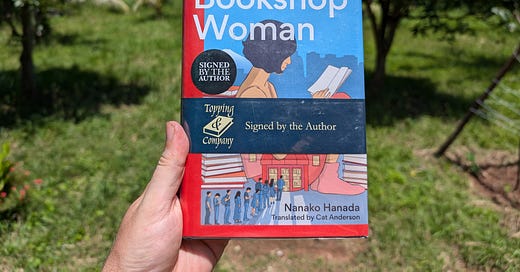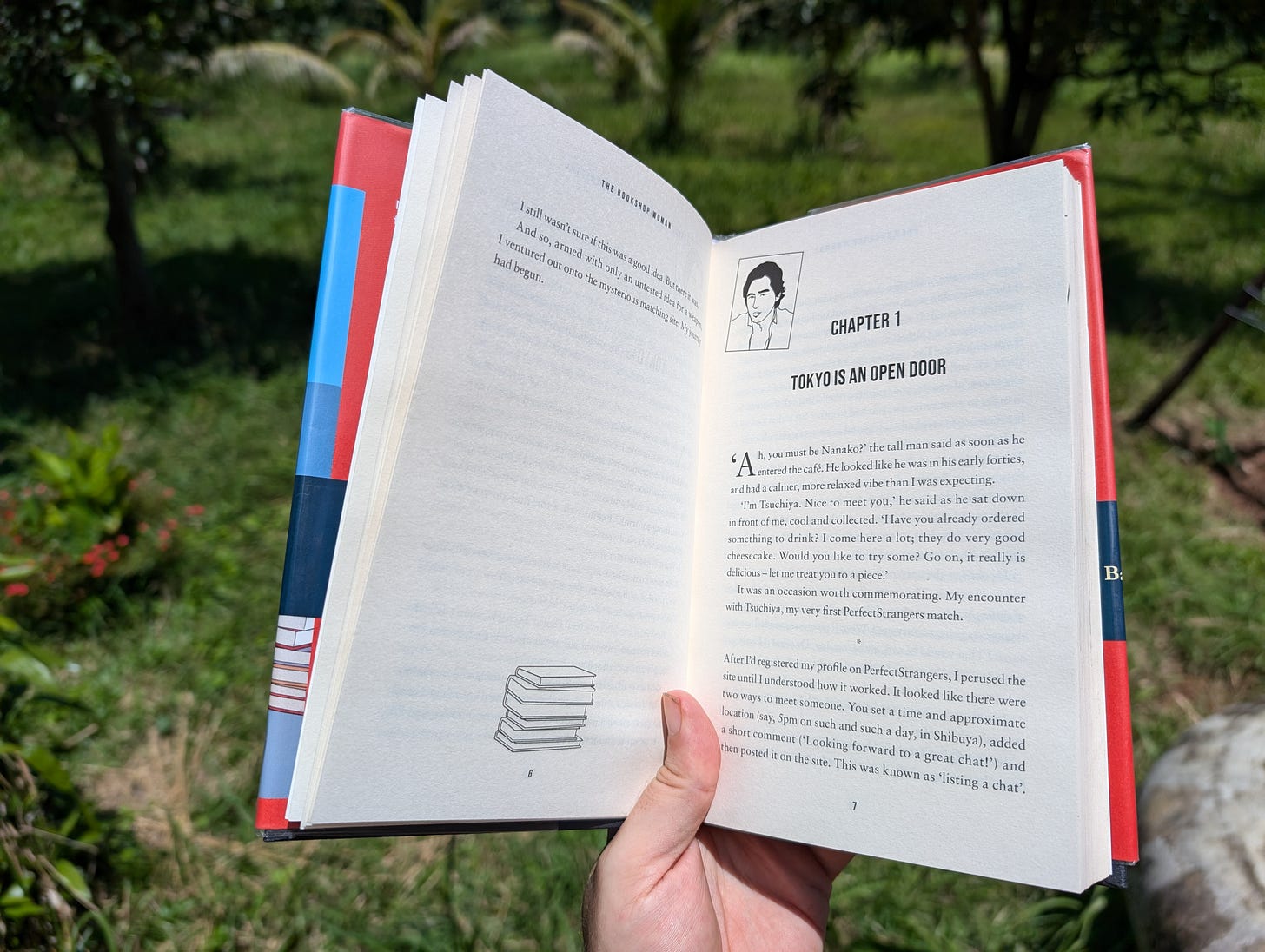I bought this book for my girlfriend a few months ago because she owns a bookshop and enjoys Japanese literature. The perfect gift! I thought. She quite enjoyed it but wasn’t blown away by it, and when she was finished and I was staying over at her house, I had the chance to read it myself.
The Bookshop Woman is not set in a bookshop as you might expect. Rather, it is about the life of Nanako Hanada[1] as she moves on from her broken marriage. One of the most interesting things about this book is that we never really know what happened to bring about the end of her marriage. The author seems to have chosen to focus entirely on one unusual aspect and to ignore—or only briefly acknowledge—everything else.
The book quickly skips from the end of her marriage to the adventure that follows.[2] That is namely the process of signing up for something called PerfectStrangers, a meet-up app that is not specifically for dating, even though later in the novel she begins to refer to it as a dating app.
Nanako is not looking for sex or love and to begin with she does not really seem to know what she is looking for, except that maybe she wants more excitement in her life. She is aimless and somewhat damaged, and beginning to realise that she is overly solitary. She wants some kind of change in life, and she realises that meeting other people might bring about positive change.
Perhaps unsurprisingly, her first two meetups are rather negative, and she goes on to have several more bad experiences. These are usually with men who push for sex. However, the good experiences drastically outweigh the bad, and as she uses the app more and more, she learns how to make it really work for her, developing a large group of friends in the process and finding herself becoming more confident.
After a while, Nanako becomes a popular member of the site due to her unusual habit of recommending books to people. Her background is as a bookshop manager, so she has a lot of knowledge in this field. The title might suggest that she is the owner of a store or that it is set there, but in fact we seldom see her working. There are some passages where we learn about her past and her working life, but as I said before, the book shies away from everything except her experiences with PerfectStrangers and her book recommendations. In that way, it is oddly and refreshingly focused.
When she realises that her initial approach is perhaps sending a bad message and encouraging creepy men, she changes her profile to include the quirk of recommending books. Perhaps “prescribing” them is a better term, though, for she makes efforts to analyse the people she meets and give them books that they will not only enjoy, but from which they will benefit. That sometimes includes people who really need help, and she believes they might find that in an appropriate book.
Each meeting is accompanied by a simple line drawing of the person she meets. Some meetings are just a few paragraphs and others go on much longer. A handful of people she meets reappear later in the book because they have an impact on her life for better or for worse.
These meetings for me were quite interesting because although they seem very random and aimless at first, it becomes apparent that Hanada (the author) wants to talk about how we judge each other. We often meet characters whose appearance or first words give an impression that is very different from their true nature, and their true nature is usually something Nanako comes to understand after talking to them for half an hour because she becomes adept at asking probing questions.
The message here is an obvious one: don’t just people so readily. That goes beyond people to professions. At one point, she learns that people in the tech industry struggle just as much as bookshop managers, which surprises her because she had assumed programmers were more in-demand and therefore highly paid.
Over the course of the book, Nanako changes a lot. She becomes more outgoing but I think the message the author wants us to take away is that she takes control of her own life. I realise this sounds clichéd and obvious. It is not a particularly deep book, to be honest, and there are various such messages that are life-affirming in a cutesy sort of way, but actually it is a subtle, pleasant, intelligent book.
I liked that it defied my expectations. It just sort of ambled along randomly for a while before it became apparent to me that there was a direction and then the book pursued that. (I won’t give any spoilers, although honestly it’s not a plot filled with significant twists—it’s just something to read and enjoy.) We meet fascinating people and follow a woman as she moves on from something bad.
One very positive aspect was the idea of appreciating different kinds of people for their various quirks. Throughout the book, Nanako meets all sorts of people and they often have peculiar interests or ways of thinking. There is a man who obsessively takes the TOIEC exam, for example. He loves it passionately. How strange!
And yet that is another message. Throughout the book, the author seems to be saying that people should find things they are passionate about and unashamedly pursue them. We are all very different and that is not a bad thing. Our diverse tastes should not be a reason to isolate or to fall into little cliques, but rather they are passions we can share with others. This may lead to very unexpected, random connections… and those of course can be the best ones.
This is not a particularly deep work, as I have said, and it is also very short. It is not a literary masterpiece that will become a timeless classic; however, it was a pleasant read that offered more than one might expect. I often stopped whilst reading it to think about the issues she casually raised, and I like that she dealt with them so easily instead of philosophising at length. Sometimes you want a book that is light and easy, yet one that makes you think. I liked also that not everything in it had to be a terrible drama. The bad experiences were not treated as catastrophic events. Even her divorce, which was obviously traumatic, is not framed as one might expect, with an evil husband having done something awful to destroy her. Most importantly, it was different from what I expected and even though it seems rather basic in some senses, I feel there is much that is covered in an engaging way.
[1] Yes, she is the author and narrator. This book reads like a novel but is in fact a memoir. I am not sure how fictionalised it is and honestly I don’t really care. I enjoyed reading it under the impression it was a novel.
[2] I’m sorry, but I have to note here that this is how On the Road by Jack Kerouac begins. You might think that’s a random coincidence, and perhaps it is, but of all the many books mentioned in this novel, On the Road is one of the few English-language ones, so clearly Hanada has read it and very possibly borrowed this device for starting a book that otherwise shares almost nothing in common with Kerouac’s work.





